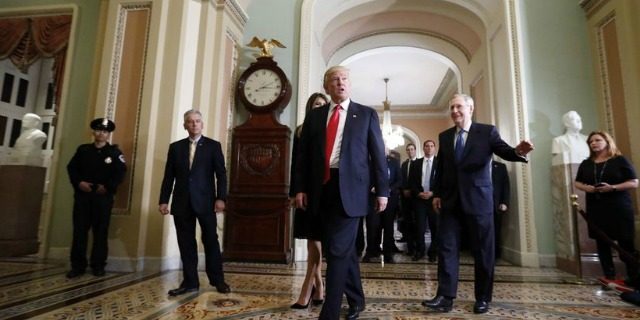President Trump and Senate Minority Leader Chuck Schumer (D-NY) have reportedly struck a gentleman’s agreement to repeal the debt ceiling in the current budget negotiations that saw Trump side with Democrats. Republicans wanted an eighteen-month increase, but Democrats wanted a three-month extension, setting the stage for another fiscal shut down in December (via WaPo):
President Trump and Senate Minority Leader Charles E. Schumer (D-N.Y.) have agreed to pursue a deal that would permanently remove the requirement that Congress repeatedly raise the debt ceiling, three people familiar with the decision said.
Trump and Schumer discussed the idea Wednesday during an Oval Office meeting. The two, along with House Minority Leader Nancy Pelosi (D–Calif.), agreed to work together over the next several months to try to finalize a plan, which would need to be approved by Congress.
One of the people familiar described it as a “gentlemen’s agreement.”
Senate Democrats hope they will be able to finalize an arrangement with Trump by December.
On Thursday, Trump was asked by a reporter at the White House about abolishing the congressional process for raising the debt ceiling. He replied that “there are lots of good reasons to do that.”
Treasury Secretary Steven Mnuchin has suggested scrapping the existing debt-limit process and replacing it with one that automatically lifts the borrowing limit every time Congress appropriates future spending.
Well, the Republican Study Committee’s response to this deal was as expected (via Politico):
Republican resistance to a deal to raise the national borrowing limit — struck Wednesday by President Donald Trump and Democratic congressional leaders — is straining GOP unity just as Congress enters the most politically treacherous stretch of the legislative calendar.
The leaders of the Republican Study Committee, an alliance of more than 150 conservative House members, panned the deal Thursday, even as Speaker Paul Ryan — who initially opposed it as well — praised Trump for seeking a bipartisan approach. The measure is expected to be attached to a bill that would send billions of dollars worth of disaster aid to Texas for its recovery from Hurricane Harvey.
“While some have advocated for a ‘clean’ debt limit increase, this would simply increase the borrowing authority of the government while irresponsibly ignoring the urgency of reforms,” RSC chairman Mark Walker (R-N.C.) wrote in a letter to Ryan. “Worse yet is attaching the debt limit to legislation that continues the status quo or even worsens the trajectory on spending, such as the deal announced yesterday by the President and Congressional Leadership.”
Walker told reporters he expects at least 100 of the group’s 150 members to oppose the deal, including two members of the Texas delegation, Reps. Jeb Hensarling and Joe Barton.
The Federalist’s Ben Domenech said that this move by Trump probably shouldn’t shock us. In fact, it’s how Trump should operate from here going forward because people want results and the GOP leadership has failed the White House consistently. He argues that there’s nothing lost to Trump screwing over his party’s leadership, as his agenda is flexible, as long as parts of it start moving through Congress. Moreover, it shows how Trump could get things done with a new version of triangulation that helped the Clinton presidency wade through the waters of a Republican Congress:
It may be that this is the first sign Trump is himself waking up to the inaccuracy of the conventional wisdom about “needing McConnell and Ryan” which has animated so much of the early failures of the Republican legislative agenda. So he’s being more honest: he doesn’t like McConnell and Ryan, never did. He likes Chuck Schumer, and knows him, and thinks he can work with him. And he knows Chuck always makes money for his partners.
there is zero downside for Trump taking sides against feckless Republicans who have failed to deliver on their promises to him or to their voters, who lag him consistently in the polls, and who are clearly being blamed more than the president for failing to deliver on their agenda. See this recent CNN poll: “Consider this: In January, 75% of Republicans and Republican-leaning independents approved of their party’s congressional leadership. Now? Just 39% approve, according to a new CNN poll. That bears repeating: Less than four in 10 REPUBLICANS approve of the job REPUBLICAN congressional leaders are doing.”
As I wrote in a recent edition of The Transom: The truth is that Trump doesn’t need McConnell. What would he need him for? Every Republican wants tax reform. Yesterday some reporters were warning darkly about the debt limit or the budget. Who do you think is more worried about the consequences of a shutdown, Trump or McConnell? And if, come December, Congress has failed to send health care, tax reform, the wall, infrastructure, had a short shutdown, and Trump and McConnell are blaming each other for the failure, who does the media think will win that fight with GOP voters? It won’t even be close.
As preposterous as this is, it’s also a glimpse of how the “pivot” to the center would work. Trump siding against GOP leaders and seeing them bend over illustrates how he could get them to do this on just about everything. The path of least resistance, the path of popularity for him, is to dismiss the demands of Congressional Republicans on virtually everything except abortion, judges, education, free speech, and regulations. In almost every other way, he has the opportunity to govern like Bill Clinton and triangulate a path through this screwed up political system. He’s that much stronger than congressional Republicans, and he doesn’t even seem to know it.
Domenech says this could be the first sign of a pivot within the Trump White House, the realization that he, not McConnell or Ryan, is in charge.










